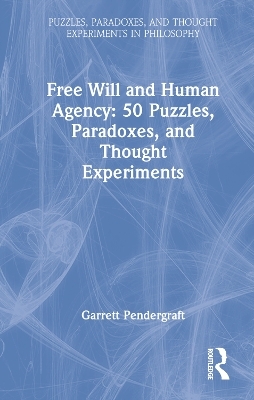
Free Will and Human Agency: 50 Puzzles, Paradoxes, and Thought Experiments
Seiten
2022
Routledge (Verlag)
978-0-367-64757-5 (ISBN)
Routledge (Verlag)
978-0-367-64757-5 (ISBN)
In this new kind of entrée to discussions of free will and human agency, Pendergraft illuminates 50 puzzles, paradoxes, and thought experiments. Assuming no familiarity with the topic, each chapter describes a case, explains the questions that it raises, summarizes some of the key responses, and provides suggested readings.
In this new kind of entrée to contemporary discussions of free will and human agency, Garrett Pendergraft collects and illuminates 50 of the most relevant puzzles, paradoxes, and thought experiments. Assuming no familiarity with the philosophical literature on free will, each chapter describes a case, explains the questions that it raises, briefly summarizes some of the key responses to the case, and provides a list of suggested readings. Every chapter is accessible, succinct, and self-contained. The puzzles are divided into five broad categories: the threat from fatalism, the threat from determinism, practical reason, social dimensions, and moral luck. Entries cover topics such as the grandfather paradox, theological fatalism, the consequence argument, manipulation arguments, luck arguments, weakness of will, action explanation, addiction, blame and punishment, situationism in moral psychology, and Huckleberry Finn. Free Will and Human Agency is an effective and engaging teaching tool as well as a handy resource for anyone interested in exploring the questions that have made human agency a topic of perennial philosophical interest.
Key Features:
Though concise overall, offers broad coverage of the key areas of free will and human agency.
Describes each imaginative case directly and in a memorable way, making the cases accessible and easy to remember.
Provides a list of suggested readings for each case.
In this new kind of entrée to contemporary discussions of free will and human agency, Garrett Pendergraft collects and illuminates 50 of the most relevant puzzles, paradoxes, and thought experiments. Assuming no familiarity with the philosophical literature on free will, each chapter describes a case, explains the questions that it raises, briefly summarizes some of the key responses to the case, and provides a list of suggested readings. Every chapter is accessible, succinct, and self-contained. The puzzles are divided into five broad categories: the threat from fatalism, the threat from determinism, practical reason, social dimensions, and moral luck. Entries cover topics such as the grandfather paradox, theological fatalism, the consequence argument, manipulation arguments, luck arguments, weakness of will, action explanation, addiction, blame and punishment, situationism in moral psychology, and Huckleberry Finn. Free Will and Human Agency is an effective and engaging teaching tool as well as a handy resource for anyone interested in exploring the questions that have made human agency a topic of perennial philosophical interest.
Key Features:
Though concise overall, offers broad coverage of the key areas of free will and human agency.
Describes each imaginative case directly and in a memorable way, making the cases accessible and easy to remember.
Provides a list of suggested readings for each case.
Garrett Pendergraft is Blanche E. Seaver Professor of Philosophy at Pepperdine University. His research focuses on understanding and responding to various threats to free will and moral responsibility.
Preface, Part I: Fatalism and other sources of existential angst, Part II: The threat from determinism(s), Part III: Practical reason, Part IV: Social dimensions, Part V: Moral luck
| Erscheinungsdatum | 06.07.2022 |
|---|---|
| Reihe/Serie | Puzzles, Paradoxes, and Thought Experiments in Philosophy |
| Verlagsort | London |
| Sprache | englisch |
| Maße | 129 x 198 mm |
| Gewicht | 453 g |
| Themenwelt | Geisteswissenschaften ► Philosophie ► Ethik |
| Geisteswissenschaften ► Philosophie ► Metaphysik / Ontologie | |
| ISBN-10 | 0-367-64757-5 / 0367647575 |
| ISBN-13 | 978-0-367-64757-5 / 9780367647575 |
| Zustand | Neuware |
| Haben Sie eine Frage zum Produkt? |
Mehr entdecken
aus dem Bereich
aus dem Bereich


